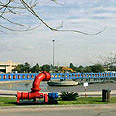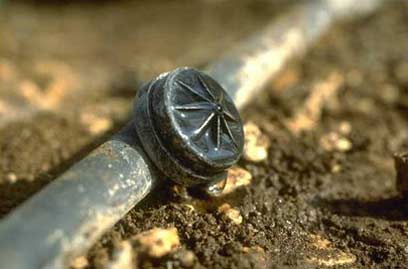
After decades of developing water technologies aiming to "make the desert bloom", Israel has shifted focus to selling its products abroad with a goal of doubling exports in the sector to $2 billion by 2010.
From ultra-violet light technology to purify water to a recycling system using millions of small, plastic rings to breed bacteria and break down organic waste, Israeli innovations are finding buyers abroad.
If a United Nations goal of improving sanitation by 2015 is to be achieved, the global market would be worth about $10 billion a year.
Daniel Wild, senior analyst at Zurich-based Sustainable Asset Management (SAM), an independent asset management group managing some $8.3 billion in assets, said Israeli technology is leading in two main segments – irrigation and desalination – because it was one of the first countries to develop efficient technologies.
"When it comes to water scarcity, Israel had to have a closer look very early," Wild said.

Leaders in irrigation solutions (Illustration photo: GPO)
About two-thirds of Israel is desert, spurring it to become one of the world's leaders in water recycling. Seventy-five percent of waste water in Israel is re-used, mostly for agriculture, said Oded Distell, director of international investments at the Industry and Trade Ministry.
Soon after Israel's first prime minister, David Ben-Gurion, declared in the 1950s that the future of the Jewish state depended on "Making the desert bloom", Engineer Simcha Blass teamed up with a kibbutz farming collective in the Negev desert to form Netafim, a company that introduced to the world a water-sparing process known as drip irrigation.
Blass invented the system after he noticed a row of bushes in a field with one plant growing taller than the others. He found that a leaky underground pipe was accidentally supplying water to that one plant but not to others.
Today, Netafim has more than $450 million in annual sales, mostly exports. One of its newest products, a wireless crop monitoring system, uses underground sensors and radios to direct the right amount of water to each section of a field.
Ultra-violet light
In a factory outside Jerusalem, engineers in the private technology company Atlantium test their newest line of ultra-violet light water purifiers.
Their product, a large quartz tube that can be attached to water pipe systems, can purify up to 200 cubic meters of water an hour.
The radiation from UV light 'inactivates' bacteria in the water so they cannot reproduce and cause infection. In the past, UV technology was unable to provide the highest level of purification and was considered a secondary technique.
Dana Cogan, Atlantium's director of marketing, said UV purification avoided the chemical by-products associated with using chlorine and was cheaper and easier than heating water.
"It's a unique reactor that they've designed," said Karl Scheible, managing director of HydroQual, a US-based environmental engineering firm that tested Atlantium's system. "Their system was even, and proved to be very efficient."
If you have the budget, the technology can be used in a backyard pool or salt-water fish hatchery, Cogan said. Each unit costs between $20,000 and $120,000, depending on the rate of purification and level of efficiency.
Sewage-eating bacteria
Hoping to cash in on the need for sewage treatment around the world, Israeli company Aqwise says its biologically based solution of breeding bacteria to break down organic waste can beat competing techniques.
The company designed a water jet system that circulates "biomass carriers" Through thousands of gallons of sewage. The carriers are small plastic rings engineered with large surface areas covered with a variety of naturally occurring bacteria that "eat" organic material in the sewage.
In a process called Attached Growth Airlift Reactor (AGAR), millions of such rings are propelled through the sewage, wearing away at the harmful waste. Aqwise's system has been bought by about 30 plants around the world and licensed by Siemens Water Technologies in North America.
Avraham Israeli, who heads an environmental and water technology consulting firm in Israel, said: "The issue with recycling is how to reduce the area and cut time that the water stays in the plant. This company has advantages over competing technologies, especially for upgrading existing plants."
Udi Leshem, Atlantium's vice president of business development, said a team from Aqwise had improved the rate of treatment at a waste recycling plant in Monclova, Mexico, to 58,000 cubic meters a day from 38,000.















